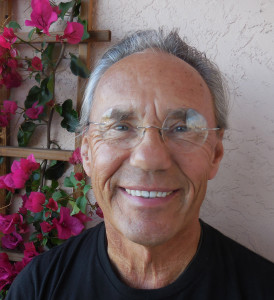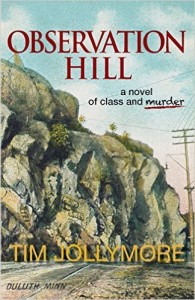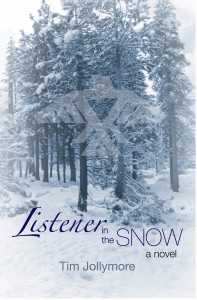[BAIPA member John Byrne Barry continues his series of BAIPA authors interviewing BAIPA authors.]
 Tim Jollymore, a former English teacher in Oakland, who grew up in northern Minnesota, has written and published two novels, Listener in the Snow, set during a winter storm in northern Minnesota amid rich Algonquin legends and family secrets; and Observation Hill, a novel of class and murder, set in Duluth, Minnesota, in the 1960s.
Tim Jollymore, a former English teacher in Oakland, who grew up in northern Minnesota, has written and published two novels, Listener in the Snow, set during a winter storm in northern Minnesota amid rich Algonquin legends and family secrets; and Observation Hill, a novel of class and murder, set in Duluth, Minnesota, in the 1960s.
Listener in the Snow won the 2015 Next Generation Indie Award for Best Fiction and a silver IPPY for Midwest fiction and design.
One personal take. Though I don’t know Tim that well, I’m on his mailing list and I saw he had a reading last summer in St. Paul, Minnesota, where I was traveling as part of a Midwest family-and-friends vacation. I mentioned to my wife and friends that it might be nice to pop into his reading in downtown St. Paul if it worked out, and it did, as we were planning on listening to some jazz just two blocks away. Tim was a more than a little surprised when we walked into the bookstore.
 Just before we talked on the phone in mid-January, he had finished a call with a member of his critique group, so I asked him about that first.
Just before we talked on the phone in mid-January, he had finished a call with a member of his critique group, so I asked him about that first.
Q: How did your critique group come to be?
The first one I belonged to didn’t suit me. So I started my own.
Q: How did you do that?
I met a couple of people at the Five Pages group [a California Writers Club-Berkeley critique group that meets monthly at the Rockridge Library in Oakland]. Another writer I knew from my teaching at Skyline High School. He wrote his book through NaNoWriMo [National Novel Writing Month]. A fourth person I met at the San Francisco Writers’ Conference. We’ve been going about a year. We recently finished reviewing my third novel, The Advent of Elizabeth, and now I’m feeding them short stories, which is probably what’s coming next for me, a story collection. We just worked through one member’s novel, and we’re about to finish another.
Q: You mentioned your third novel, The Advent of Elizabeth. Sounds like you’ve finished it.
What do you mean by finished?
Q: What do you mean by finished?
I have an editor in New Hampshire, someone my daughter knows from her MFA program, and I’ve already made revisions based on his critique, as well as my own ideas of what the book needed. I’m going to give the editor one more pass at it, revise, then share it with my beta reader group. I’m aiming to put it out sometime in May, with an official launch at the Oakland Library, Lakeview Branch of the Oakland Library, April 30 at 2 pm.
Q: You already have that scheduled?
I like to work with deadlines.
Q: How did this book come to be?
It started the way all three have started—with a very small image or event that I know about. My books are not based on real life, but are inspired by real-life events. Listener in the Snow started with the image of a man sitting on a bar stool. Observation Hill was born from a comment a docent made about a murder, on a train ride in Duluth. This third book is inspired by two events I know about—the seduction of a high school student by a teacher, and a stabbing death in a high school.
The fictional murder happened in 1967. Doug, the catcher on the high school baseball team, confesses to this murder, though he didn’t do it. He was covering for his brother, or so he thought.
The seduction began—I say began because it was an extended affair—in 1960, but the novel starts in 1991, during the high school centennial, which brings everyone together.
“Everyone” includes a coach who had befriended Doug while he was in prison, Elizabeth, the seducee-turned-corrupter, and her onetime lover, now an aged teacher and self-confessed serial-seducer of many high school coeds. The story spins out at this reunion in three days, with complications like someone sending out cryptic notes designed to stir the pot of murder and debauchery. The notes ask, in effect: If Doug didn’t do it, then isn’t the real murderer still out there?
Q: What did you learn from writing it?
This book, like each of my books, is an experiment. Five years ago, I decided to teach myself how to write. My experimental focus with The Advent of Elizabeth is point of view. The book has multiple points of view (very common these days), first person, second person, third person, and stream of consciousness (present tense). One character, Monsignor Phelan, mutters to himself as he works through his day:
“How I hate these summer mornings! Stuff a pillow over my head. Those confounded birds still stir up a racket. Silence. In the name of the Lord, I say, silence!”
Everything with him is presented as it comes up in his mind or from his mouth or from what he hears.
Another character, one of the teachers, speaks directly and frankly to the reader Though he’s not open, honest, and direct with anyone else, the readers get an eyeful: “I am telling the god-awful truth, mainly because at this point I have nothing to lose. ‘How about reputation?’ you say. . .”
Q: I caught one stop of your Midwest tour, in St. Paul, but I understand that was one of many. How many events did you do?
I made 47 visits. There were five kinds of events. One was the ad hoc cold call, which I did toward the end, when I had some time to fill. I just called on bookstores, stopping in without calling. I’d introduce myself—had the books and an agreement with me—and said I’d like to leave these on consignment. I was usually able to refer to people they knew, other booksellers in the chain. Reception wasn’t always kind, but mostly it was. I concentrated on BookWorld stores, a 41-store chain headquartered in Appleton, Wisconsin, where I had already done events.
Another event was called Totally Criminal Cocktail Hour, which was sponsored by Valley Bookseller in Stillwater, Minnesota. They sell 50 tickets, for $10 each, and supply hors d’oeuvres at a local restaurant. I appeared in character, as P.S. Tuom, the detective in Observation Hill. The author introduced the character, and I changed clothes right in front of folks. At one point, P.S. takes out a cigarette and says, “You don’t mind if I smoke, do you?” They were aghast. P.S. shook his head and mumbled, “I keep thinking it’s 1967.” They loved it. I sold a heck of a lot of books.
Of course, I also did talks and readings, like the one you came to at Subtext Books in St. Paul. I also did a talk at Finlandia University, speaking about Finnish American identity. All three books have Finnish characters.
Often I did meet-and-greets outside bookstores, where I set up a table, greeted people, and sent them inside to buy the book.
Q: Would you do such a tour again?
I’ve done one for each book. And I also did a library tour in Minnesota. I’ll start putting together next year’s tour, starting in April. It’s definitely worth it, and it gets easier because I’ve now met many booksellers, readers and instructors at universities.
Books are not flying off the shelves all over, but in Park Rapids, Minnesota, a town of 7,000 or 8,000, with two small bookstores, one of the booksellers proudly told me, “I’ve sold 35 copies of ‘Listener’ this year.” It helps that the setting of my first two novel is Minnesota, and that I’ve been there three times. In the summer of 14, the spring of 15, and the summer of 15. So even though it’s very arduous and The Advent of Elizabeth is set here in California, I am going back to the Midwest in August.
Q: You’ve sold more than 1,000 copies of your first book, Listener in the Snow. How?
Now it’s 1,200 in sales and counting. There are three main ways—direct sales (one-on-one), consignment sales through bookstores, and online. It’s about one-third each way.
Q: What’s the best and worst thing about the touring?
The best thing is that I get to meet wonderful people in the flesh: Readers, other writers, professors and booksellers. Not to mention friends. On Facebook, there was this person who was following me, but I didn’t know who it was. Turned out she was someone I dated in high school. Now, she’s a happily married grandmother. She came to Fitger’s in Duluth with her husband Chris and friends. We had a wonderful time. I have friends and family in Duluth and St. Paul, so the tour also gives me a chance to visit them.
The downside is that I do some camping, which I like, though less when it rains. I drove to the Midwest from Oakland, put 11,000 miles on a Subaru Forester I bought just for the trip. I sold it for the same price when I got back. It was like Travels Without Charlie.
I don’t or can’t write while I’m on tour and since my last trip, I’ve done nothing but revision and marketing. I haven’t gotten back to a regular writing regime. Since 2011, I’ve written three novels, a play, plus a bunch of short stories. It became a habit to write from 9 to noon every day. I got along with the people because I was creating them. That was wonderful. I want to get back there.
Q: But don’t you think revision is writing?
I count it as different. It feels less like creating. For the first time since I began writing, the flow has slowed to a trickle. I’ve started my fourth book, but haven’t made much progress.
The medicine is that I’ve signed up for a book conference in southern California. A novel-writing intensive, where I’ll work on starting the novel. It gives me a goal. I’ve got to submit more pages between now and Valentine’s Day, then spend two intense days in the seminar.
What do you do when you’re not writing?
It used to be, I wrote from 9 to noon, then did whatever I wanted. But then I learned about marketing, and budgeting. Fellow-writer Lloyd Lofthouse told me, “I spend at least eight hours a day on this stuff.” He smiled, as always. Now, I understand the grin.
I’m not really an aficionado of anything, but I go to jazz concerts. I went to a talk the other day given by Julia Gillard, former prime minister of Australia. I go to concerts, the symphony. I walk. Wordsworth, Keats, all the romantic poets walked. Walking is the most important thing a writer does.
If you would like to be part of this wonderful ongoing series, contact John at [email protected].